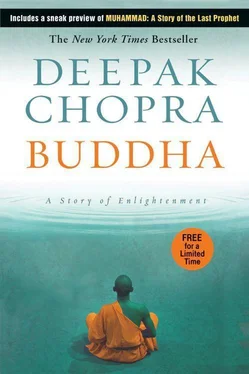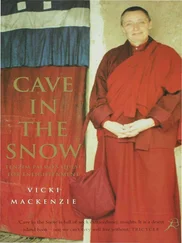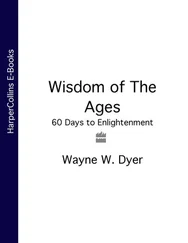“When I was a warrior,” he said, “I learned that victory could never be achieved without weapons. We have no weapons, but we will prevail anyway.”
Without a word he walked directly up to the two fighters and without hesitation strode into the space between them.
“Get away, stranger,” one soldier shouted. “If you don’t move, you’ll be hurt.”
“Is that possible?” said Buddha. “Try.”
The two enemies stared at him in disbelief. “You must be insane,” said one. “Run away, monk. If I have to, I’ll slice you through with my blade.”
“That would be interesting to see,” Buddha said. His calmness was so unnerving that the two soldiers lowered their weapons, losing the edge of their fighting rage. From the sidelines Assaji shouted, “If you touch him, you are hurting a holy man. That’s a sin.”
Buddha turned and gave him a sharp look. “None of that,” he rebuked. He shifted his attention back to the two soldiers. “You both do your duty to the gods, but that hasn’t saved you from a lifetime of killing and fear. Why stop now? If you are so reckless with fate that you risk meeting your dead enemies in hell, I won’t stop you. I invite you to run me through with your blade. I will even forgive you in advance.”
By the time he spoke the last word, the two fighters were hanging their heads. Buddha reached out and lightly touched the daggers and swords, which dropped to the ground. “Shame has made you lose your taste for killing,” he said. “Go home and find a better way to live.”
“I can’t,” said one fighter. “If I run away from battle, the king will take away my house; there will be no food for my family.”
“I promise you that won’t happen,” said Buddha. “Your king is going to disband his whole army today.”
The two soldiers were amazed and wanted to ask more questions, but Buddha signaled to the five monks and walked on. When they looked over their shoulders, the fighters were gone.
“I’ve shown you the first way peace can prevail,” said Buddha. “Some people can be reached by speaking to their conscience. Those are the ones who already know that they want to find an end to suffering. Through conscience, guilt, and shame, they will recognize their wrong when it is told to them.”
“How many people are like that?” asked Assaji.
“Not enough.”
Next Buddha led them to where the fighting was more concentrated: clusters of soldiers clashed in a whirling chaos of steel, horses, and shouts. For a moment Buddha stood apart. “What do you see?” he asked.
“Bloodshed and carnage. Something I wouldn’t look upon willingly,” said Assaji.
“Look a little deeper,” said Buddha. “These are people who cannot listen to conscience, not because they are bad but because they are too caught up in action. You cannot preach to someone who is fighting for life and breath, not just in war but in the ordinary struggle of existence.”
Buddha approached the fray, and a wildly flailing sword missed his head by inches. The monks cried out, but Buddha reached out and caught the blade in midair. He seized it from the swordsman, who turned his head with eyes that began to bulge out. Buddha was holding the sharp edges of the blade tight in his fist. The opposing swordsman saw his chance and lunged at his enemy. Buddha reached out and grabbed the second sword by the blade, wrenching it from the soldier’s hand.
The soldiers were stunned with disbelief. “Who are you?” one cried as they fell to their knees.
“I am what you need at this moment,” said Buddha.
He dropped the weapons and walked deeper into the combat. As he got nearer, the fighting calmed. Fighters held their weapons frozen in midair like statues. Buddha seemed to cut an open swath in the battlefield as he passed. The five monks rushed after him in his wake.
“What’s happening?” asked Assaji breathlessly.
“What do you suppose?” said Buddha. “This is a miracle.”
Buddha proceeded through the entire army. “I am showing you another way to prevail,” he said. “Sometimes you must show yourself as you really are. People who are lost in the struggle of existence have become prisoners of illusion. Just remember one thing: you are made of light, and when it is fitting, you may have to prove it.”
Assaji remained baffled by the awe that Buddha was creating among the soldiers, some of whom actually held their hands over their eyes to shield them. To Assaji, however, Buddha looked completely normal. “Why don’t I see the miracle?” he asked.
“Because you are even more distracted than these soldiers,” said Buddha with a smile. “You keep thinking I’m here to get you killed.”
At that, Assaji suddenly found himself relaxing; he had been as tense as a tightened wire. He exhaled deeply, and then he saw that Buddha was surrounded by an aura of brilliant white light. The army beheld a being of light moving through their midst, and the sight brought them to their knees.
“Master, forgive me. I see now that you can save multitudes,” said Assaji in awe.
“This isn’t salvation,” said Buddha. “Just a glimpse of reality. Everyone is deeply asleep. It will take more than one glimpse to wake them up.”
Vappa, who had been listening close by, said, “No one will ever see me this way.”
“Why not?” said Buddha. “I do already.”
He remained silent as they made their way through the heart of battle. On the fringes one could still hear the clash of war, but as far as the eye could see, every soldier had laid down his weapons. It took half an hour to cross the entire field. The tents of the generals came into view. Buddha pointed to the highest tent pole, which flew a brilliant red and yellow ensign. “My father.” The older generals shivered when they saw the return of the prince from the dead; all the officers bowed low, then they followed in Buddha’s wake as he approached the royal tent.
Buddha parted the tent flap and went inside. In the dim, hot interior, the old king lay on a cot. He had fallen asleep while putting on his armor. He was groaning and turning over restlessly, his arms thrashing. Buddha made a gesture, and Assaji came inside.
“I want you to see everything,” Buddha said. “But keep in a corner for now. We don’t want to overwhelm him.”
Assaji backed away into the shadows. Then Buddha approached the cot and touched his father on the shoulder. Suddhodana didn’t start but woke up slowly, rubbing his eyes. It took a moment for his mind to grasp what he was seeing, and three words escaped his mouth separated by long pauses. “Who? No. You!” The old king began to weep.
“Don’t be afraid, father.” Buddha embraced the old man, and they stood together like that, while to Assaji’s surprise Buddha himself was silently weeping. Suddhodana recovered his speech in broken expressions. Where did Siddhartha come from? Who had been beheaded? But more frequently he recriminated himself for being such a fool.
A surge of anger hardened the old king and brought a sudden burst of energy. “Devadatta will pay for this.” he said crisply. “I have to fight. This is no place for you. Have some men escort you back to the palace.” Suddhodana reached for the chest plate and helmet he was putting on before he fell asleep. He averted his eyes from his son. “I know you are a monk now, Siddhartha, but unless we win this battle, your father will be a beggar.” Suddhodana had never reconciled himself to his son’s choice, and now his only thought was that the kingdom needed a defender. Instead of stopping him, Buddha stood aside and let the old king armor himself, pick up his sword, and rush from the tent.
“You’re going to let him fight?” asked Assaji, disbelieving.
“He’s a warrior; his nature is conflict,” said Buddha.
Читать дальше












